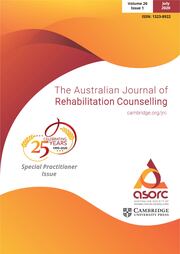Article contents
Mechanisms of Change in Psychotherapy for People Diagnosed with Schizophrenia: The Role of Narrative Reflexivity in Promoting Recovery
Published online by Cambridge University Press: 10 June 2014
Abstract
Narrative reflexivity was investigated as a potential mechanism of therapeutic change during a 12–18 month trial of Metacognitive Narrative Psychotherapy for people diagnosed with schizophrenia. Participants were nine adult clients (8 male, 1 female) aged between 25–65 years (M = 44, SD = 12.76) with a diagnosis of schizophrenia consistent with DSM-IV criteria and seven female provisional psychologists aged between 25–29 years (M = 26.8 years, SD = 1.47 years). Recovery and narrative reflexivity were measured at three time points using the Recovery Assessment Scale (RAS) and the Narrative Processes Coding System (NPCS). Results were reported descriptively due to limited sample size (n = 9). The majority of clients (n = 7) reported an increase in recovery over the course of treatment. For six clients, an overall increase in recovery was associated with an increase in narrative reflexivity. This study provides preliminary support for narrative reflexivity as a potential mechanism of therapeutic change in the psychotherapy of people diagnosed with schizophrenia.
Keywords
- Type
- Articles
- Information
- Copyright
- Copyright © The Author(s), published by Cambridge University Press on behalf of Australian Academic Press Pty Ltd 2014
References
- 6
- Cited by




